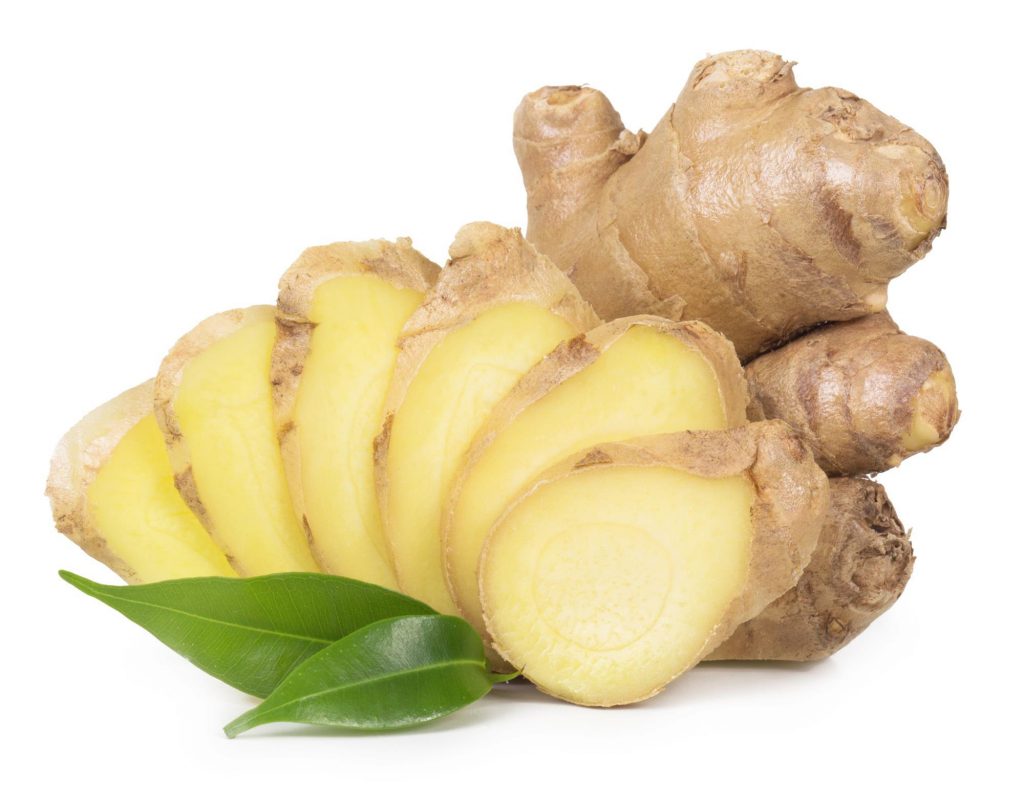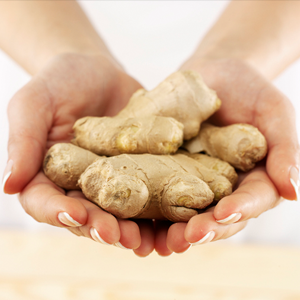Ginger may have numerous health benefits due to its anti-inflammatory, anti-nausea, and other properties. It may help you lose weight, manage arthritis, reduce menstrual symptoms, and more.

Ginger is included in the list of medicinal herbs, and its roots are usually used as a spice, and it can be eaten fresh, drunk with infusions or decoctions, or used powder or oil for therapeutic purposes.
It has been used as a traditional remedy for thousands of years, and is famous in Chinese and Indian medicine for treating many health problems.
The health benefits of ginger were as follows:
Helps promote cardiovascular health
Ginger has been found to promote circulatory health and help reduce the risk of cardiovascular disease by reducing cholesterol levels.
In addition to being a source of a group of important minerals necessary for the functioning of the heart muscle and arteries and to regulate blood pressure, such as: potassium, magnesium, and manganese.
To achieve this benefit, pressure patients are advised to eat fresh ginger, not ground ones.
Contributes to the reduction of sugar levels
One of the benefits of ginger is that ginger contributes to lowering blood sugar levels, promoting the health of diabetics in general, and protecting them from some of the complications associated with diabetes.
However, it is advised for diabetics not to exceed the intake of 4 grams of ginger per day so that the effects do not become adverse and negatively affect their health, so that a sharp drop in sugar occurs.
Helps prevent cancer
Ginger contains high levels of antioxidants and active substances that made it a good contributor to the suppression of the following types of cancers:
Colon cancer.
Prostate cancer.
Skin cancer.
Lung cancer.
Colorectal cancer.
Contributes to the treatment of headaches
One of the benefits of ginger is that it contributes to the treatment of headaches, so ginger is used as a sedative and pain reliever, and has a role in treating migraines.
It also helps fight inflammation in the body that may be the cause of headaches, headaches, relieving dizziness, nausea, and any symptoms that may accompany headaches .
Contributes to the treatment of respiratory infections
Since ancient times, ginger has found a role in the treatment of respiratory problems, as it contributes to the following:
Relieve symptoms of colds, winter diseases.
Treatment of sore throat, dilates the airways.
Relieves cough, expels phlegm.
Helps improve sexual health
It was found that one of the benefits of ginger is that it promotes blood circulation, which made it an effective role in contributing to improving sexual health, which was represented in the following:
Increased libido.
Treatment of some problems of impotence and weakness.
Strengthening erections in men.
Delay the ejaculation process in a man.
It enters into the treatment of unpleasant smell of the vagina.
Supports the digestive system
One of the benefits of ginger is that ginger supports the digestive system in general and treats some intestinal disorders, it helps the following:
1 Prevent nausea and vomiting.
2 Promote digestion.
3 Increase the absorption of nutrients, by stimulating the secretion of digestive juices and saliva.
4 Lubricate and facilitate bowel movement.
5 Treatment of intestinal confusions.
6 Prevention of stomach ulcers, by increasing the mucus secreted in them and protecting their inner wall.
7 Irritable bowel syndrome treatment.
The benefits of ginger for hair
Ginger helps in treating many hair problems and strengthening it, as it was found that ginger oil when applied to the hair and massaging the scalp with it constantly helps the following:

1 Increased hair growth.
2 Treatment of the problem of hair loss.
3 Treatment and elimination of dandruff problem.
4 Fight the appearance of white hair caused by some psychological factors or a lack of some nutrients, and it is recommended to add honey to it to increase its effectiveness.
The benefits of ginger for the skin
The limit of the benefits of ginger is that it contributes to the freshness of the skin, as ginger contains antioxidants that make it have aesthetic benefits that accrue to the freshness of the skin, as it helps the following:

1 Lighten and purify the skin.
2 Sterilize the skin and protect it from infections.
3 Smooth out wrinkles.
4 Fight the signs of aging in the skin.
5 Acne treatment.
6 Unifying and filtering skin tone.
The role of ginger in weight loss
It was found that people’s intake of ginger contributed to their loss of approximately 20% of the fat intake, and the reason for this is due to the following:
Ginger contains high levels of dietary fiber that helps increase the feeling of fullness of the stomach, thus increasing the feeling of satiety.
Ginger’s ability to encourage metabolism and promote fat burning in the body, making it an effective role in slimming and weight loss.
Nutritional value of ginger
The benefits of ginger result from its high nutritional values, as each 100 grams of fresh ginger root contains the following nutritional value:
proteins 1.82 g carbohydrates 18 gram Fat 0.75 g Dietary fiber 2 g Vitamin C 5 g Vitamin B6 (Pyridoxine) 0.16 g Potassium 415 gram Iron 0.6 g Magnesium 43 gram
Read more about Benefits of olive oil .
